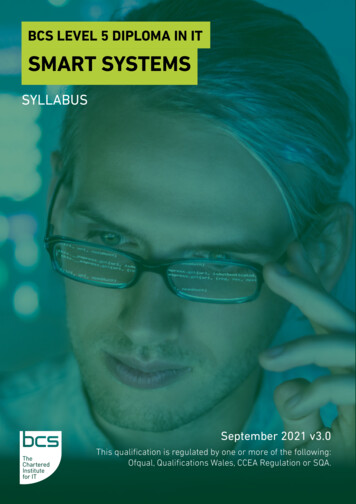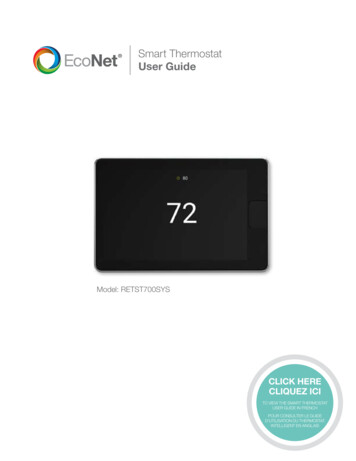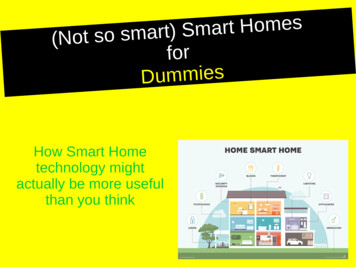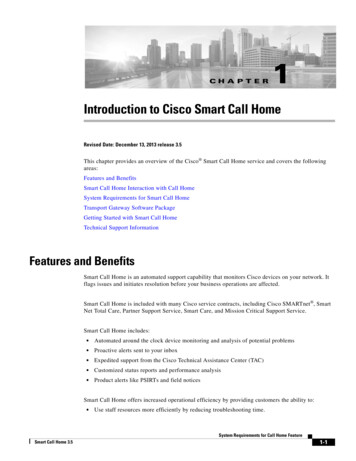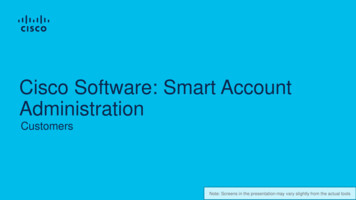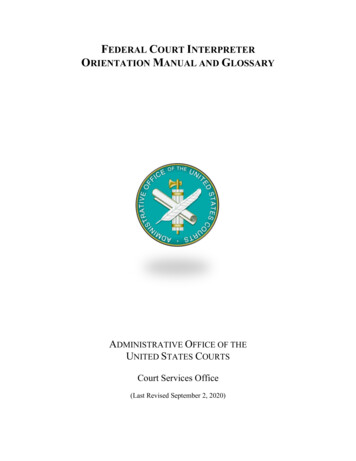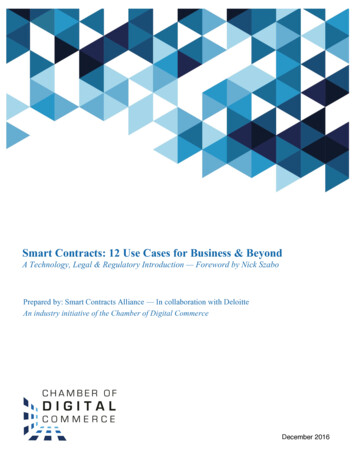
Transcription
Smart Contracts: 12 Use Cases for Business & BeyondA Technology, Legal & Regulatory Introduction — Foreword by Nick SzaboPrepared by: Smart Contracts Alliance — In collaboration with DeloitteAn industry initiative of the Chamber of Digital CommerceDecember 2016
About the Chamber of Digital CommerceThe Chamber of Digital Commerce is the world’s largest trade association representing the digital asset andblockchain industry. Our mission is to promote the acceptance and use of digital assets and blockchain-basedtechnologies. Through education, advocacy and working closely with policymakers, regulatory agencies andindustry, our goal is to develop a pro-growth legal environment that fosters innovation, jobs and investment.ContactChamber of Digital Commerce1133 15th Street, NW, 12th FloorWashington, D.C. 20005policy@digitalchamber.org 1-202-765-31051
Table of ContentsForeword by Nick Szabo3Acknowledgments4Overview7Smart Contract Use Cases14Digital Identity15Records17Securities19Trade Finance21Derivatives23Financial Data Recording25Mortgages27Land Title Recording29Supply Chain31Auto Insurance33Clinical Trials35Cancer Research37Legal and Regulatory39Smart Contracts: 12 Use Cases for Business & Beyond Chamber of Digital Commerce2
Forewordby Nick SzaboIt is exciting to see my vision for smart contracts, that I conceived over 20 years ago, blossom into so manydifferent and creative directions. Evolution toward smart contracts would be inevitable even if the concept did notexist. Financial companies have, since I first explored these ideas in the 1990s, already implemented what areeffectively smart contracts without using that phrase.As much as smart phones are more functional than traditional phones, which in turn are in many ways morefunctional than messages written on paper, smart contracts can be more functional than their inanimate paper-basedancestors. Smart contracts can automate many different kinds of processes and operations, most obviously paymentand actions conditional on payment. For example, making control of collateral dependent on whether a debtor haschosen to pay a loan on time – the fundamental logic here is automating “if-this-then-that” on a self-executing basiswith finality.The humble vending machine is the original form of a smart contract. At its core, a vending machine is a securitymechanism: the amount in the till should be less than the cost of breaching the till. Additionally, the machineryreflects the nature of the deal: it computes and dispenses change as well as the customer’s choice of product. Todaythe most secure environments for smart contracts are the most mature public blockchains, which are designed fortrust minimization instead of trusting the often private and insecure system found resident with a central party.Many of the smart contracts proposed or described in this paper, or elsewhere, are meant to operate between largeinstitutions, or between institutions and their customers. The smart contract goes beyond enterprise businesssolutions – in fact my personal favorite and most exciting type of smart contract is constructed in peer-to-peerenvironments, from simple natural language by individuals to operate between individuals. This movie will geteven more exciting when machine-to-machine adoption takes shape at the intersection of blockchain, artificialintelligence and the Internet of Things.Smart contracts involve objectively verifiable performances, or performances that can be automated such as cashflows. As a result, financial contracts, broadly and creatively defined, present obvious opportunities. Smartcontracts can reduce the costs of people having to calculate complicated outcomes, and thereby make possible newkinds of contracts that weren’t possible before. Contracts-for-difference, are an example where software veryrapidly and continually adjusts balances and can dispense cash flows based on frequently updated market prices.Smart contracts — by minimizing the need to trust a counterparty, a third party, or a foreign legal system — canalso reduce counterparty risk and expand credit and other contracting opportunities through such trust-shiftingtechnology.Blockchain technology appears very much to be the jet fuel necessary for smart contracts to become commonplacein business transactions and beyond. It is a delight to be part of a community committed to fostering the tenants ofopen source cooperation, privacy and security, education in technology and working for a common social good.3
AcknowledgementsThe Chamber of Digital Commerce would like to thank the following individuals and organizations for theirthought leadership, oversight and support to the Smart Contracts Alliance, and the production of this white paper:Smart Contracts Alliance LeadershipLewis CohenJohn JacobsMatthew RoszakPartnerHogan Lovells LLPExecutive DirectorGeorgetown University Center forFinancial Markets and PolicyCo-Founder & Chairman, BloqChairman, Chamber of DigitalCommerceAlan CohnCaitlin LongMark SmithOf CounselSteptoe & Johnson LLPPresident and ChairmanSymbiontJerry CuomoJoseph LubinIBM Fellow and VP ofFounderConsenSysBlockchain TechnologiesIBMCo-Founder & CEOSymbiontRonald SmithPartnerNorton Rose FulbrightMargo TankJeff GarzikSean MurphyCo-Founder & CEOBloqPartnerNorton Rose FulbrightPartnerBuckleySandler LLPMarley GrayJames Newsome, Ph.D.Lata VarghesePrincipal Program Manager,Azure Blockchain EngineeringMicrosoftJ. Dax HansenPartnerPerkins Coie LLPThomas HardjonoChief Technology OfficerMIT Connection ScienceFounding PartnerDelta Strategy GroupAssistant Vice President, BlockchainConsulting Practice LeaderCognizantEric PisciniMark WetjenGlobal FSI Blockchain LeaderDeloitteGlobal Head of Public PolicyDepository Trust & ClearingCorporationJim ReganMicah WinkelspechtPresident & CEODigital Federal Credit Union (DCU)Founder & CEOGEMSmart Contracts: 12 Use Cases for Business & Beyond Chamber of Digital Commerce4
AcknowledgementsThe Chamber of Digital Commerce would also like to thank the following individuals and organizations for theirvaluable contributions to the Smart Contracts Alliance, and the production of this white paper:Subject Matter ExpertsBertrand AlexisRouven HeckMichael RossAttorneyHarvard Law SchoolProduct Lead - Digital IdentityConsenSysPresidentParagon Public Relations LLCEdgard AlvarezChristine IngSue RossCounselHogan Lovells LLPPartnerBlake, Cassels & Graydon LLPSenior CounselNorton Rose FulbrightGriffin AndersonJordan KrugerIra J. SchaeferHead of Blockchain AccountingConsenSysData ScientistBloqPartnerHogan Lovells LLPJames J. Angel, Ph.D.Mark LaddMichael SenaAssociate Professor, Georgetown University Center forFinancial Markets and PolicyVP, Industry & Regulatory AffairsSimplifileProduct ManagerConsenSysMarc AronsonChristian LundqvistJacqueline ShinfieldPresident & CEOPennsylvania Association of NotariesDecentralizationConsenSysPartnerBlake, Cassels & Graydon LLPJudd BagleyScott MehlmanMichael SinclairCEOOrebits.ioConsultantNorton Rose FulbrightThessy MehrainDana SyracuseDirector of CommunicationsOverstock.com & t0.comBrian BlahaPartnerWipfli LLPUX & Product StrategyConsenSysSenior CounselPerkins Coie LLPPreston ByrneJerry L. MillerManish TomerCOO & General CounselMonaxPartnerWipfli LLPDirector, Blockchain ConsultingCognizantMichael ChodosTheodore MlynarC. Richard TriolaGeneral Counsel, Senior VPNotarizeTom DingCo-Founder & CEOString LabsPartnerHogan Lovells LLPJennifer PeveCEONotaryCam, Inc.R. David WhitakerCo-head Office of FinTech StrategyDepository Trust & Clearing CorporationSenior CounselBuckleySandler LLPCarla ReyesEmily VaughnEVP, eStrategiesDocutechBruce R. Jacobs Visiting Assistant Professor of LawStetson University College of LawHead of AccountsGemRashi GoyalYorke RhodesMichael ZimitsManager, Blockchain ConsultingCognizantGlobal Business Strategist / Blockchain & IdentityMicrosoftPresident & COOOrebits.ioHarry Gardner5
AcknowledgementsThe Chamber of Digital Commerce would like to acknowledge the following individuals from Deloitte for theircontributions to the production of this white paper:Deloitte TeamMayank SinghalPrakash SanthanaSenior ConsultantDeloitte Consulting LLPDirectorDeloitte Transactions & Business Analytics LLPAbhishek BiswasSoumak ChatterjeeSenior ManagerDeloitte & Touche LLPSenior ManagerDeloitte CanadaJoan CheneySachin JadeSenior ManagerDeloitte & Touche LLPSpecialist LeaderDeloitte & Touche LLPSean CreminsChashak TulsyanBusiness Technology AnalystDeloitte Consulting LLPBusiness Technology AnalystDeloitte Consulting LLPChamber LeadershipDan SpullerPerianne BoringJason BrettFounder and PresidentChamber of DigitalCommerceDirector of OperationsChamber of DigitalCommerceKevin BattehRalph BenkoChase FreemanSenior Policy AdvisorChamber of DigitalCommerceBlockchain AssociateChamber of DigitalCommerceChief Policy AdvisorChamber of DigitalCommerceDirector of Member ServicesChamber of DigitalCommerceSmart Contracts: 12 Use Cases for Business & Beyond Chamber of Digital Commerce6
Overview7
What Are Smart Contracts?In 1996, Nick Szabo described a smart contract as “a set of promises, specified in digital form, including protocolswithin which the parties perform on these promises.”1 While the technology available to support smart contracts hasevolved considerably since then, this definition continues to capture the essence of what a smart contract is anddoes.Taking each element of Szabo’s definition in turn:“a set of promises”“specified in digital form” Depending on the model of smart contractdeployed (see page 9: What are the differentmodels for smart contracts?), such promises maybe contractual or non-contractual They may consist of contractual terms and/orrules-based operations designed to carry outbusiness logic A smart contract operates electronically It consists of lines of code as well as the softwarethat prescribes its conditions and outcomes Contractual clauses and/or functional outcomesare embedded as code within software“protocols”“within which the parties perform” A computer protocol in the form of an algorithmconstitutes a set of rules for how each partyshould process data in relation to a smart contract The idea of automated performance is at the heartof a smart contract Technology-enabled, rules-based operationsenable actions to be performed, such as therelease of payment Driven in part by the technology that typicallyhosts a smart contract (that is, blockchaintechnology), smart contracts are traditionallyregarded as irrevocable Once initiated, the outcomes for which a smartcontract is encoded to perform cannot typicallybe stopped (unless an outcome depends on anunmet condition)Smart Contracts: 12 Use Cases for Business & Beyond Chamber of Digital Commerce8
Smart Contract ModelsWhat are the different models for smart contracts?It is a common misconception that there is only one type of smart contract. In fact, there is a spectrum ofpossibilities.Smart Contracts Lie on a SpectrumContract entirely in codeContract in code withseparate natural languageversionEncoding Natural Language“Split” natural languagecontract with encodedperformanceNatural language contractwith encoded paymentmechanismAutomationOther permutations are, of course, possible and are likely to emerge as smart contract applications develop.The role of codeThe legal status of smart contracts is dealt with elsewhere in this white paper. For now, it is sufficient to note thatsmart contracts that seek to encode the entirety of a natural language contract (a “code is the contract” model) arevery challenging from a legal perspective. The model puts into question an issue potentially relevant for all smartcontracts: has a legally binding contract formed?9
Smart Contract ModelsRegardless of model the smart contract deployed, they all involve code. Code can contain bugs. Code may notalways perform as the parties had intended. Messages transmitted over the internet can be delayed orinterrupted, and data can be corrupted in transmission. Private encryption keys can be obtained by hacking. Theliability implications of these kinds of events need to be carefully considered.It is likely that once a model is demonstrated to work in a live environment, not only will it be adoptedelsewhere, but smart contracts will, with developments in the underlying technology, incrementally becomemore sophisticated over time. It is quite possible that, within a relatively short timeframe, smart contracts willbe doing significantly more than just automating aspects of the performance of a contract.What makes up a smart contract?Smart contracts are typically deployed on a blockchain (although it is possible for other platforms to host themtoo). Within a blockchain view of this, smart contract program logic sits within a “block.” A block is asoftware-generated container that bundles together the messages relating to a particular smart contract. Thosemessages may act as inputs or outputs of the smart contract programing logic and may themselves point toother computer code.Smart Contracts: 12 Use Cases for Business & Beyond Chamber of Digital Commerce10
How Do Smart Contracts Work?How is a typical smart contract initiated? It is necessary to have some understanding of the terminology:A blockchain is permissioned when its participants are pre-selected orsubject to gated entry based on satisfaction of certain requirements or onapproval by an administrator. A permissioned blockchain may use aconsensus protocol for determining what the current state of a ledgershould be, or it may use an administrator or sub-group of participants todo so.PermissionedPermissionlessConsensus11A blockchain is permissionless when anyone is free to submit messagesfor processing and/or be involved in the process of reaching consensus(for example, the Bitcoin blockchain). While a permissionlessblockchain will typically use a consensus protocol to determine what thecurrent state of the blockchain should be, a blockchain could equally usesome other process (such as using an administrator or sub-group ofparticipants) to update the ledger.A consensus protocol is computer protocol in the form of an algorithmconstituting a set of rules for how each participant in a blockchainshould process messages (say, a transaction of some sort) and how thoseparticipants should accept the processing done by other participants. Thepurpose of a consensus protocol is to achieve consensus betweenparticipants as to what a blockchain should contain at a given time.Terms used to describe consensus protocols in the context of blockchaintechnologies may include “proof of work” or “proof of stake.”
How Do Smart Contracts Work?the anatomy of aSMART CONTRACT12 Multiple parties identify a cooperative opportunity and desiredoutcomesBlockchain technologies use public key encryptioninfrastructure (PKI). Someone (we’ll call this person theinitiator) wishing to participate in a smart contract hostedon, say, a permissionless blockchain can: Agreements potentially in scope could include business processes,asset swaps, transferal of rights and more Download the software from publicly available sourcesIDENTIFY AGREEMENT Use an address (an alphanumeric character uniquelyallocated to it by the software) to generate a public keySET CONDITIONS Smart contracts could be initiated by the parties themselves or bysatisfaction of certain conditions like financial market indices,natural disasters or event via GPS location Temporal conditions could initiate smart contracts on holidays,birthdays and religious events34CODE THE BUSINESS LOGIC A computer program is written in a way that the arrangement willautomatically perform when the conditional parameters are metENCRYPTION & BLOCKCHAINTECHNOLOGY Encryption provides secure authentication and verification ofmessaging between the parties relating to the smart contract5Initiating a smart contract Publish the public key on the system publiclyAt the same time, the blockchain will also generate acorresponding private key for the initiator’s address. Thiskey is held securely by the software.If the initiator wishes to trigger a smart contracttransaction on the relevant ledger, it uses its address tosend an initiating message, encrypted with its private key,to the other participants. The message is picked up by theparticipants’ computers (called “nodes”).Messages purporting to be from the initiator’s address canonly be signed off on by a person in possession of theinitiator’s private key. Participants with access to thepublic key (which they receive from the software) can useit to verify that the smart contract transaction wasinitiated by the initiator in possession of the private keyand to authenticate the message contents.EXECUTION & PROCESSING In a blockchain iteration, when consensus is reached onauthentication and verification, the smart contract is written to ablock The code is executed, and the outcomes are memorialized forcompliance and verified6NETWORK UPDATES After performance of the smart contract, all computers in the networkupdate their ledgers to reflect the new state Once the record is verified and posted to the blockchain, it cannot bealtered, it is append onlySmart Contracts: 12 Use Cases for Business & Beyond Chamber of Digital Commerce12
How Do Smart Contracts Work?Writing a smart contract message to a blockchainIn a typical permissionless blockchain deployment, when a sufficient quantity of other participants or nodes, reachthe same conclusion (more than 50 percent), the blockchain’s applicable consensus protocol determines that themessage relating to the smart contract should be added to the blockchain. Alternatively, such a determination mightbe reached by an administrator, in a permissioned blockchain.Public key cryptographyAs mentioned earlier, blockchain technology uses public key encryption infrastructure (PKI). PKI is a method ofcryptography that uses of two types of keys. The first is a public key that all parties are aware of, and the second is aprivate key known only to its recipient. In a smart contract transaction initiated on a blockchain, the sendingrecipient encrypts their message into an unreadable ‘cipher text’ using algorithms or mathematical formulas, toprotect and secure the data. Only the use of a private key can decrypt the ‘cipher text’ back into a readable ‘plaintext ’. The key benefit PKI brings to smart contract transactions revolves around security, as it is extremely difficult,if not impossible, to reverse engineer a public key to a private one, making it very resilient to failures or hacks.how does BLOCKCHAINCRYPTOGRAPHY work?Plain textSenderCipher textEncryptPlain textDecryptDifferent keys are used toencrypt & decrypt messagesRecipient’s Public Key13Recipient’s Private KeyRecipient
Use CasesTwelve Use Cases for Smart ContractsSmart Contracts: 12 Use Cases for Business & Beyond Chamber of Digital Commerce14
Smart Contracts for Digital IdentitySmart contracts can enable individuals to own and control theirdigital identity containing reputation, data and digital assets. Thisallows individuals to choose what personal data to disclose tocounterparties, giving enterprises the opportunity to seamlesslyknow their customers.15
Smart Contracts for Digital IdentitySelf-sovereign digital identity enabled by smart contracts provides seamless, user-centeredinternet for individuals.Current StateFuture StateIdentity held by user, verified by 3rd partiesSocial MediaPeoplePassportUserBankUserPeopleSocial MediaPassportSelf-Sovereign IdentityGovernmentSelf-Sovereign IdentityBank ABank BApprovedApprovedBank AGovernmentBankDocumentsBank BGovernmentCurrent ChallengesSmart Contract Benefits Expensive and time consuming Know YourCustomer (KYC) processes that lackcompleteness Limited control over potential data leakage dueto an individual’s reliance on trusted thirdparties High liability to safeguard user data presents asingle point-of-failure and a target for hackers Individuals own and control personal data (e.g.able to securely disclose personal data tovarious counterparties) Counterparties will not need to hold sensitivedata to verify transactions, reducing liabilitywhile facilitating frictionless KYC Increased compliance, resiliency andinteroperabilitySmart Contract Considerations Fostering an acceptance of digitally provided attestations within a legal framework and establishing trustin the security of smart contracts Technical integration with attestation providers Formation of protocols and standards to deliver interoperability by the involved partiesSmart Contracts: 12 Use Cases for Business & Beyond Chamber of Digital Commerce16
Smart Contracts for RecordsSmart contracts can digitize Uniform Commercial Code (UCC) filing,and automate their renewal and release processes. Additionally,smart contracts can atomically perfect a lender’s security interest atthe moment of a loan creation.17
Smart Contracts for RecordsAutomation of compliance, with rules requiring destruction of records on a future date enabled by smart contracts, andUniform Commercial Code (UCC) liens that auto-renew, auto-release, or automatically call for collateral are all possiblethrough smart contracts.Current StateRegisteredAgentBank’sLawyerPeriodic RenewalsBank’sLawyerFuture StateRegisteredAgentSmart ContractUniform CommercialCode FilingState GovernmentState GovernmentArchivesArchivesSmart Contract BenefitsCurrent Challenges Paper-based filing for many foundationaldocuments of finance with government Reduced legal bills through auto-renewal andauto-release of digitized UCC filings Error-prone, manual process forrenewing/releasing Uniform Commercial Codefilings results in latency Automated processes, including calling bylenders for additional collateral and tracking ofloan vs. collateral value Expired archival data stored with governmentoccupies warehouses and incurs additionalcosts Archival data automatically becomesunsearchable/unreplayable after it reaches itssunset dateSmart Contract Considerations Smart contract platform must be capable of storing data on a distributed ledger without slowingperformance or compromising data privacy Active involvement of lenders and registered agents must exist for more complex functions (e.g. autorelease or automated call for additional collateral) Clarification regarding whether courts would consider a document legally destroyed if it is merelycryptographically unsearchable rather than removed from the ledgerSmart Contracts: 12 Use Cases for Business & Beyond Chamber of Digital Commerce18
Smart Contracts for SecuritiesCapitalization table management can be simplified, andintermediaries circumvented in the chain of securities custodythrough the implementation of a smart contract. The smart contractcan facilitate the automatic payment of dividends, stock splits andliability management, while reducing counterparty and operationalrisks.19Smart Contracts: 12 Use Cases for Business & Beyond Chamber of Digital Commerce
Smart Contracts for SecuritiesSimplification of capitalization table management for private companies can be enabled by smart contracts, while alsoreuniting record ownership with beneficial ownership of publicly traded securities, reducing cost, and counterparty risk.Current StateFuture StateIssuerIssuerTitleCede &CompanyCustodianSub-CustodianSmart ContractCustodianSub-CustodianInvestorCurrent Challenges Paper-based, manual corporate registrationprocesses Companies that fail to keep their corporateregistrations up-to-date require clean-up andcertificate of good standing before issuingsecurities Intermediaries increase cost, counterparty riskand latencyInvestorSmart Contract Benefits Digitized end-to-end workflows due tosecurities existing on a distributed ledger Trade date plus zero days (T 0) securitiessettlement cycles Facilitates automatic payment of dividends andstock splits, while enabling more accurateproxy voting Removes counterparty and operational riskscreated by intermediariesSmart Contract Considerations Benefits may be realized more quickly in private securities markets than in public securities markets The cryptographic signature of the State of Delaware on the ledger entry takes the place of the State’sseal on paper stock certificates, which may require enabling legislation to clarify that Delaware corporatelaw permits registration on a distributed ledger While issuers would welcome visibility into who owns their securities, some buy-side firms (e.g. activistinvestors) carefully protect this information20
Smart Contracts for Trade FinanceSmart contracts can facilitate streamlined international transfers ofgoods through faster Letter of Credit and trade payment initiation,while enabling higher liquidity of financial assets.21Smart Contracts: 12 Use Cases for Business & Beyond Chamber of Digital Commerce
Smart Contracts for Trade FinancePayment method and instrument automation enabled by smart contracts provides risk mitigation and improvedfinancing and process efficiencies for buyers, suppliers and financial institutions.Current StateFuture StateTrade AgreementLetter of Credit Issued and Forwarded Issuing BankReimbursing BankLetter of Credit Issued and ForwardedAdvisingBank Smart Contract(Deferred Payment Asset)Credit AdviceSmart Contract(Letter of Credit)Letter ofLetter ofDocument Presentment and PaymentSellerSmart ContractBuyerCredit AdviceCredit IssuanceSellerDocuments ReleaseRequest for Letter ofBuyerReimbursing BankIssuing BankAdvisingBank Reimbursing BankReimbursing BankSmart Contract BenefitsCurrent Challenges Time-consuming and costly Letter of Creditissuance process due to required coordinationand paperwork Faster approval and payment initiation throughautomated compliance and monitoring of Letterof Credit conditions Physical document management can delayshipment receipt until title document is released Improved efficiency in creating, modifying andvalidating trade, title and transport-relatedcontract agreements High document fraud/duplicate financing dueto de-linked processes Increased liquidity of financial assets due toease of transfer and fraud reductionSmart Contract Considerations Industry-wide standards for smart contract templates and procedures must be implemented for wideracceptability and adoption Legal implications for potential smart contract execution fall-out must be determined (in particular fordefaults and dispute resolution) Integration with settlement systems, off-chain ecosystems and technology prerequisites (e.g. Internet ofThings) must be successful to achieve full benefitsSmart Contracts: 12 Use Cases for Business & Beyond Chamber of Digital Commerce22
Smart Contracts for DerivativesPost-trade processes can be streamlined through smart contracts,eliminating the duplicative processes performed by each counterpartyfor recording and verifying trades, and executing applicable tradelevel and other lifecycle events.23
Smart Contracts for DerivativesEnforcing a standard set of rules and conditions to a transaction enabled by smart contractsoptimizes post-trade processing of over-the-counter (OTC) derivatives.Current StateFuture �Counterparty‘B’PaperAgreementsSmart ContractRecordsReconcileBusiness RulesTradeData rceData SourceReconcileRecordsTradeTerms of taReference DataSmart Contract BenefitsCurrent Challenges Redundant and time-consuming processes dueto asset servicing being managed independentlyby each counterparty for most OTC derivatives Automated settlement of obligations whileexecuting triggered processing of trade events(e.g. periodic payments) Paper-based transaction agreements thatcontain terms, trade agreements and/or posttrade confirmations Automated external event processing (e.g.credit) and/or succession events Enabled real-time valuation of positions forreal-time exposure monitoring, while reducingerrors and/or disputesSmart Contract Considerations Establish proper governance of a blockchain network and its smart contracts to properly manage largescale protocol changes to existing contracts due to regulatory reform, change in contract or otherunforeseen events Agreement upon lifecycle events for OTC derivatives (e.g. external source of data) Integration and governance of oracles required to feed smart contracts with information to/from theblockchain networkSmart Contracts: 12 Use Cases for Business & Beyond Chamber of Digital Commerce24
Smart Contracts for Financial Data RecordingFinancial organizations can leverage smart contracts for accurate,transparent recording of financial data. Smart contracts enableuniform financial data across organizations, improved financialreporting and reduced auditing and assurance costs.25
Smart Contracts for Financial Data RecordingSmart contracts enable accurate recording of financial data for entities entering into financialtransactions.Current StateFuture StateAccount SystemsAccount SystemsPaymentsBookkeeperPurchase OrderBookkeeperSmart ContractAccount SystemsAccount SystemsGoodsBookkeeperInvoiceBookkeeperSmart Contract BenefitsCurrent Challenges Accounting systems are prone to fraud anderrors since they are controlled directly byentities Improved transactional data integrity andtransparency, yielding increased marketstability Capital intensive processes due to each firmmaintaining their own infrastructure Reduced expenditure for accountinginformation systems by cost-sharing acrossmultiple organizations Significant human capital/middleware requiredto process transactions from systems that do notinteroperate Improved insight into parties’ capital due toincreased financial accessibilitySmart Contract Considerations Development of a portal to streamline smart contracts that fac
1 Chamber of Digital Commerce 1133 15th Street, NW, 12th Floor Washington, D.C. 20005 policy@digitalchamber.org 1-202-765-3105 The Chamber of Digital Commerce is the world's largest trade association representing the digital asset and

